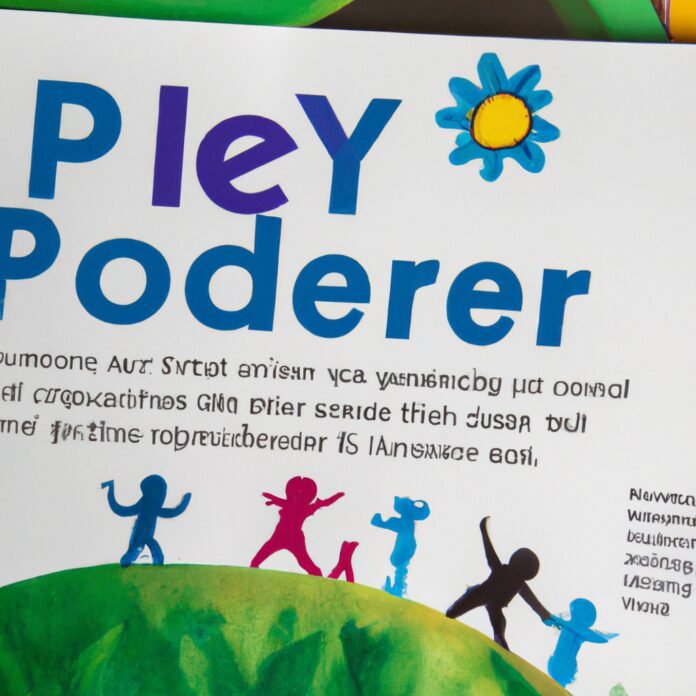As we observe the joy and promise of childhood, we can’t help but be reminded of the power of play. Whether it’s playing tag with friends, learning to ride a bike, or building a sandcastle at the beach, play is an indispensable part of a child’s development. In this article, we explore the different types of play and the ways in which they can help children grow and develop.
1. The Role of Play in Early Childhood Development
Play is the cornerstone of early childhood development. The innumerable benefits it offers makes it something which children of all ages should readily engage in. As each stage of a child’s life brings with it new challenges and opportunities, the benefits of playful activities can vary drastically.
Stimulates Cognitive Development: Play is essential in stimulating a child’s cognitive development. Through play, children are able to develop their problem-solving and communication skills as well as their ability to verbally express their emotions. This in turn helps them better understand the world around them.
Improves Physical Capabilities: Engaging in physical play such as running, jumping, and climbing is key in developing a child’s physical capabilities. By playing, children can improve their gross and fine motor skills, as well as their hand-eye coordination. Such physical skills are incredibly important for a child’s overall development.
Encouraging Social Skills: Playing not only promotes physical development, but it also encourages social communication and interaction. When children come together through playing, they are able to learn cooperation, negotiate, and develop communication skills. Teamwork and friendship can also be fostered through play.
- It stimulates cognitive development
- It improves physical capabilities
- It encourages social skills
Play is essential to a child’s development. Through different activities, children learn many skills that will help them grow and develop. It is therefore important that we provide them with ample opportunities to engage in play and support their development in this aspect.
2. Exploring Various Types of Play
Imagination Play
From the moment a child is born, play is essential for their physical and mental development. Imagination play is just one form of play that allows children to use and create stories through their imaginations. This type of play encourages children to explore complex emotions, roles, ideas, and events. Through play, children can practice problem-solving, engage in healthy communication, develop self-esteem and learn to express themselves creatively.
Educational Play
Another type of play children engage in is educational play, or structured play. This type of play is highly beneficial for teaching a child fundamental skills such as problem-solving, creativity, and language development. Educational play incorporates lessons, activities, and games that teach a child various essential subjects such as mathematics, reading and science. Educational play is a powerful tool for disseminating knowledge, developing character and preparing children for the future.
Physical Play
Lastly, physical play is a fundamental element in child development. Physical play gives children the opportunity to challenge their physical capacities, interact with others and train their motor skills. Playing outdoors is especially important during the early years when children crave freedom and exploration. Outdoor activities such as running, climbing, or playing tag are a powerful way to encourage physical development while aiding the social and emotional development of children.
Conclusion
In conclusion, it’s clear that play can aid in the development of children. Different types of play serve different needs and offer unique benefits depending on their structure, content and activity levels. As parents and guardians, it is important to provide your child with diverse opportunities and settings for play.
3. Creative Play: The Role of Imagination
As children grow, they become more curious, imaginative and creative. With good guidance and support, their creative faculties develop and they explore the world around them with newfound energy. Creative play is an integral part of the development process. Through imagination and play, children:
- Expand their knowledge of the world. Creative play offers a safe space to take risks and explore ideas. This helps to build their understanding about the world around them as they interpret and question the surrounding world.
- Discover their interests and passions. Creative play encourages them to identify and develop their passions, interests, and talents. It encourages self-expression and builds their confidence.
- Grow in problem-solving capabilities. Creative play helps to develop problem-solving capabilities. It allows them to practice making decisions, work through problems, and find solutions through experimentation and play.
In addition to encouraging creative thinking and problem-solving skills, creative play also helps to build and maintain relationships. It encourages children to collaborate and work together to solve problems and create new and exciting ideas. Through creative play, children can learn to appreciate their own strength as well as respect the ideas of other players.
4. Cooperative Play: The Significance of Group Interaction
Group interaction plays a key role in cooperative play, since it directly encourages communications skills, perspective taking, idea sharing, problem solving and more. Working with others to accomplish a common goal not only provides an opportunity to gain new insight into different areas, but it also helps extend and develop the capabilities of group members.
Social Development: Working together promotes social development by motivating learners to communicate effectively, share and take turns, negotiate tasks, listen to other people’s ideas and cooperate with others. Through a collaborative task, learners also learn about sharing ideas and experiences, being respectful of others and their backgrounds, as well as learning how patience and understanding can improve the group dynamic.
Skills Reinforcement: Cooperative play can help learners practice and strengthen new skills or abilities. For example, learners engaged in cooperative play might be asked to practice a specific language, math, reasoning or problem solving skill.
Group interaction also provides an opportunity for peer modeling, wherein learners can learn from and help each other in their learning process. By observing and being observed while engaging in a shared task, learners can reflect upon on their own abilities and learn from the diverse experience of the other learners.
- Group interaction allows learners to interact with a diversity of backgrounds and learn from each other
- Cooperative play encourages communication and share of ideas, skills and opinions
- Teamwork supports learners in developing and practicing new skills and knowledge
- Peer modeling helps learners reflect on their own abilities and learn from the experiences of others
In short, cooperating with others through group activities reinforces learning and helps create rewarding experiences. In addition to providing a platform for personal and social development, cooperative learning also helps learners become more confident, improves understanding, increases engagement, builds team spirit, and develops important communication and organizational skills.
5. Outdoor Play: The Benefits of Physical Activity
The importance of outdoor physical activity has considerable benefits for children’s health and overall wellbeing. Regular exercise helps children develop strong bones and muscles, while improving cardiovascular outcomes. It also helps build coordination and gross motor skills, boosts confidence and self-esteem, and encourages a love of activity for years to come.
Outdoor play also kindles imagination and creativity. Children’s active imaginations are naturally filled with fascinating ideas to explore and create new play and games, and active engagement will often last for hours. Access to nature further encourages learning experiences, as children explore the natural environment, search for living things to observe, or even create their own natural structure or creations.
Here are some additional benefits that come from outdoor physical activity:
- Develops agility, balance, and coordination
- The opportunity to meet new friends and socialize
- Establishes a connection with nature
- Leads to increased physical endurance
Taking part in physical activities outdoors can help children lead better, healthier lives. Regular physical exertion contributes to improved concentration in school, better sleep, and the opportunity to try new things, as well as teaching kids to take risks and come up with creative solutions. It’s also a great way for children to increase self-worth and self-confidence, by mastering physical activities.
When it comes to play, it can be an incredibly powerful tool in a child’s development. It doesn’t have to be a complex game or gadget — all that is necessary is an open mind and a desire to have fun. Allowing children to explore different types of play can help to open up new worlds and at the same time, cultivate an environment for learning, growth and understanding. So grab a crayon, a ball or a board game and join the world of playful possibilities!




